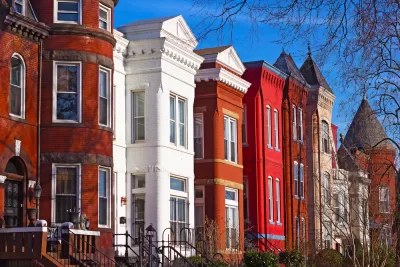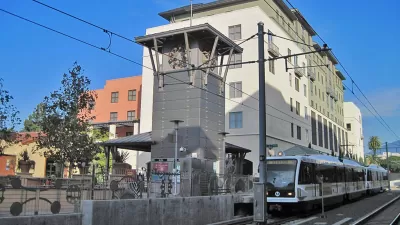As new construction favors single occupants and childless professionals, the capital's housing stock is increasingly boxing out families.

There are signs that D.C.'s housing stock is becoming less family-friendly. Mark Chambers writes, "According to an Urban Institute study, four and five bedroom units make up only eight and four percent of the homes in the city, respectively. Given that almost 12% of families that rent have four or more people, even the unsubsidized market for multi-bedroom rental homes is fairly tight."
Why is this happening? Developers can make greater profits catering to the professional demographic living in one- and two-person households. Building small but "luxury" units for them increases the rate of return on larger developments. At the same time, older buildings contain many of the units with three or more bedrooms. When they're redeveloped, one to two bedrooms becomes the norm.
"Finally, a more insidious and dangerous trend is appearing: language that implies the idea that families with children don't belong in neighborhoods with childless millennials and empty nester baby-boomers." Chambers advocates changes to the Comprehensive Plan to address the problem.
FULL STORY: Let’s make sure there are homes for families in DC

Alabama: Trump Terminates Settlements for Black Communities Harmed By Raw Sewage
Trump deemed the landmark civil rights agreement “illegal DEI and environmental justice policy.”

Study: Maui’s Plan to Convert Vacation Rentals to Long-Term Housing Could Cause Nearly $1 Billion Economic Loss
The plan would reduce visitor accommodation by 25% resulting in 1,900 jobs lost.

Planetizen Federal Action Tracker
A weekly monitor of how Trump’s orders and actions are impacting planners and planning in America.

Waymo Gets Permission to Map SF’s Market Street
If allowed to operate on the traffic-restricted street, Waymo’s autonomous taxis would have a leg up over ride-hailing competitors — and counter the city’s efforts to grow bike and pedestrian on the thoroughfare.

Parklet Symposium Highlights the Success of Shared Spaces
Parklets got a boost during the Covid-19 pandemic, when the concept was translated to outdoor dining programs that offered restaurants a lifeline during the shutdown.

Federal Homelessness Agency Places Entire Staff on Leave
The U.S. Interagency Council on Homelessness is the only federal agency dedicated to preventing and ending homelessness.
Urban Design for Planners 1: Software Tools
This six-course series explores essential urban design concepts using open source software and equips planners with the tools they need to participate fully in the urban design process.
Planning for Universal Design
Learn the tools for implementing Universal Design in planning regulations.
Caltrans
Smith Gee Studio
Institute for Housing and Urban Development Studies (IHS)
City of Grandview
Harvard GSD Executive Education
Toledo-Lucas County Plan Commissions
Salt Lake City
NYU Wagner Graduate School of Public Service





























